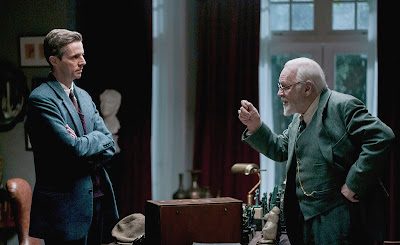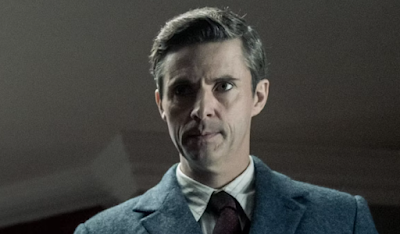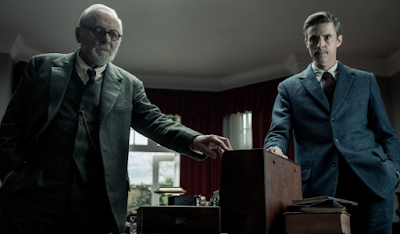September 3, 1939. The world is on the brink. A monumental session with two of the greatest minds of the twentieth century over the future of mankind and the existence of God.
Freud's Last Session, directed by Matt Brown, presents a unique and thought-provoking cinematic experience. Set against the backdrop of World War II, the film delves into a fictional meeting between two towering intellectuals: Sigmund Freud, played by Anthony Hopkins, and C.S. Lewis, portrayed by Matthew Goode. Though the war itself does not play a direct role in the narrative, its looming presence adds a layer of urgency and gravitas to their encounter.
The story imagines a conversation between Freud, the father of psychoanalysis, and Lewis, an author and former atheist who converted to Christianity. This premise sets the stage for a rich dialogue exploring their starkly opposing views on religion, human nature, and the meaning of life. The screenplay, co-written by Mark St. Germain, Matt Brown, and Armand M. Nicholi Jr., crafts a narrative that weaves together philosophical debates, personal histories, and emotional undercurrents.
Hopkins, as Freud, delivers a performance that, while reminiscent of some of his previous roles, captures the intensity and brilliance of the renowned psychologist. Freud is depicted as sharp, sarcastic, and relentless in his critiques of religion, which he dismisses as an "infantile delusion." His famous declaration, "I have only two words to offer humanity: grow up!" encapsulates his disdain for the concept of a benevolent deity in a world filled with suffering.
Goode's portrayal of Lewis, on the other hand, offers a more subdued yet equally compelling counterpoint. Lewis, though respectful and polite, stands firm in his faith, attributing human suffering to mankind's own flaws rather than divine will. His calm demeanour often leaves him overshadowed by Freud's fiery rhetoric, yet his resilience and depth shine through in their exchanges.
The film's structure is largely conversational, reflecting its origins as a stage play. This "talky" approach may feel like eavesdropping on an extended intellectual debate, which can be both a strength and a limitation. The staginess of the narrative at times slows the pacing, despite efforts to break it up with flashbacks and scenes outside Freud's Hampstead house. These interludes, including Lewis's memories of the Battle of the Somme and his relationship with a fallen comrade's mother, provide context and emotional depth but sometimes feel like distractions from the central dialogue.
A notable aspect of the film is the presence of Anna Freud, portrayed by Liv Lisa Fries. Her relationship with her father adds a significant layer of dramatic tension. Anna, a psychologist in her own right, navigates the complexities of her father's towering legacy and domineering personality. Fries's performance captures Anna's strength and vulnerability, making her one of the film's most compelling elements.
The interactions between Freud and Lewis reveal more commonalities than initially apparent. Both men share a deep curiosity about humanity, stemming from their lonely childhoods and complicated family dynamics. This shared background allows for moments of connection amidst their intellectual sparring. Their discussion touches on themes such as the nature of faith, the purpose of suffering, and the impact of sexual repression on familial relationships.
Despite the film's ambitious exploration of profound themes, it struggles to fully capture the brilliance of its protagonists. The dialogue, while elegantly worded, sometimes feels more like a classroom debate than a transformative conversation. The theological discussion, although central to the film, lacks a sense of progression or resolution, leaving viewers feeling that neither character has truly moved beyond their initial positions.
Freud's Last Session attempts to bridge ideological divides, perhaps subtly addressing contemporary political and cultural polarization. By showing that two people with vastly different beliefs can engage in a civil and meaningful dialogue, the film offers a model for respectful discourse in an increasingly divided world.
Yet, the film's execution does not always live up to its potential. Brown's direction, though well-intentioned, sometimes falters with clumsy staging and a lack of dynamic progression. The film's reliance on dialogue over action might deter some viewers, but those who appreciate a cerebral cinematic experience will find much to admire.
Ultimately, Freud's Last Session is a film that invites viewers to ponder big questions about faith, reason, and the human condition. It is a testament to the power of the mind and the enduring relevance of intellectual debate. While it may not fully satisfy those seeking dramatic flair or narrative resolution, it offers a rare and valuable focus on the life of the mind, free from the distractions of more conventional cinematic tropes.
Freud's Last Session is a film that resonates with those who value thoughtful dialogue and the exploration of complex ideas. Despite its imperfections, it succeeds in creating a space for reflection and conversation, embodying the very essence of intellectual inquiry.
Freud's Last Session was released in NZ cinemas on May 30, 3034






